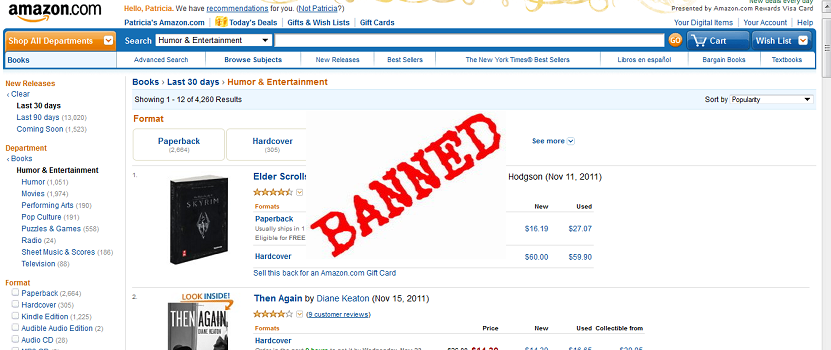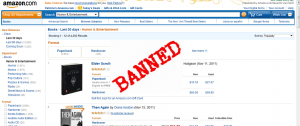
Avoid Getting Banned from Amazon as an Author – Part 2
 Avoid Getting Banned from Amazon as an Author – Part 2
Avoid Getting Banned from Amazon as an Author – Part 2
Back to part 1 – Onto Part 3
Now onto to the slightly more disputable item, the confidentiality…
3. Revealing confidential information
If you ever wondered why it is so difficult to find out statistics about sales figures by self-published writers, here it is, underlined below, in an extract of Amazon KDP Terms and Conditions.
7 Confidentiality. You will not, without our express, prior written permission: (a) issue any press release or make any other public disclosures regarding this Agreement or its terms; (b) disclose Amazon Confidential Information (as defined below) to any third party or to any employee other than an employee who needs to know the information; or (c) use Amazon Confidential Information for any purpose other than the performance of this Agreement. You may however disclose Amazon Confidential Information as required to comply with applicable law, provided you: (i) give us prior written notice sufficient to allow us to seek a protective order or other appropriate remedy; (ii) disclose only that Amazon Confidential Information as is required by applicable law; and (iii) use reasonable efforts to obtain confidential treatment for any Amazon Confidential Information so disclosed. “Amazon Confidential Information” means (1) any information regarding Amazon, its affiliates, and their businesses, including, without limitation information relating to our technology, customers, business plans, promotional and marketing activities, finances and other business affairs, (2) the nature, content and existence of any communications between you and us, and (3) any sales data relating to the sale of Digital Books or other information we provide or make available to you in connection with the Program. Amazon Confidential Information does not include information that (A) is or becomes publicly available without breach of this Agreement, (B) you can show by documentation to have been known to you at the time you receive it from us, (C) you receive from a third party who did not acquire or disclose such information by a wrongful or tortious act, or (D) you can show by documentation that you have independently developed without reference to any Amazon Confidential Information. Without limiting the survivability of any other provision of this Agreement, this Section 7 will survive three (3) years following the termination of this Agreement.
What this means is that, however tempting it might be to drive traffic to your blog or website by publishing your sales figures, information that, however obscure the author, is likely to find a hungry audience, you do so at your own risk and perils. Simply by publishing these numbers, you actually give Amazon the right to ban you from their program. But, will you say, I did find a few authors who do publish their sale numbers, and Amazon has not banned them.
That is correct, yet, if for any reason in the future, Amazon decides that they really want to put the lid on any information about sales figure, or if the author who publish these figures decides to go an a rant against Amazon for any reason, Amazon is perfectly entitled to terminate the agreement as the author is in breach of contract.
4. Failing to abide to the conditions warranting payment of royalties
4. Failing to abide to the conditions warranting payment of royalties
This is how Amazon legally protects its interests and reserves the rights to keep the royalties that are due to the author according to the number of books sold if the author is found in violation of the Terms and Conditions. Please read the extract below with the utmost attention.
5.4.2 Payment Terms. Amazon parties will pay Royalties on their respective Digital Book sales approximately sixty (60) days following the end of the calendar month […] We can withhold, offset or reduce Royalties as follows:
(iii) If we terminate this Agreement because you have breached your representations and warranties or our Content Guidelines, you forfeit all Royalties not yet paid to you.
(iv) Upon termination of this Agreement, we may withhold all Royalties due for a period of three months from the date they would otherwise be payable in order to ensure our ability to off-set any refunds or other offsets we are entitled to take against the Royalties.
(v) If after we have terminated your account you open a new account without our express permission, we will not owe you any Royalties through the new account.
Our exercise of these rights does not limit other rights we may have to withhold or offset Royalties or exercise other remedies.
Note how Amazon reserves the right to keep all outstanding due royalties in case of breach of representations and warranties or, and this is where it becomes interesting, if case of breach of their Content Guidelines.
Please, before we broach the topic of the Content Guidelines this coming Monday, note how the language of this text is couched in legalese as befits a binding contract. Keep that in mind when we get to the Content Guidelines section that, for some mysterious reasons, is in an entirely separate page and, as we will see, written by someone who, apparently, never has read anything remotely resembling a legal document. We leave you with the entire week-end to fully digest the potential implication of being found in breach of the Content Guidelines, as it is essential to fully integrate these implications before we analyze these fateful guidelines.
In the meantime, we hope you appreciate the irony that this blog is trying to get financed by an Amazon astore, thus is in effect, asking Amazon to finance its critics :-), so shop from here to keep the watchdog running…